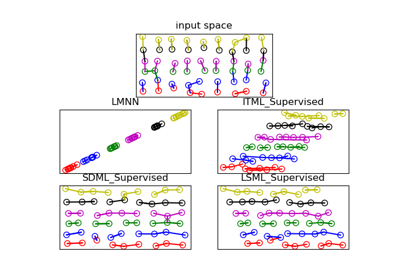metric_learn.base_metric.BaseMetricLearner
- class metric_learn.base_metric.BaseMetricLearner(preprocessor=None)[source]
Base class for all metric-learners.
- Parameters:
- preprocessorarray-like, shape=(n_samples, n_features) or callable
The preprocessor to call to get tuples from indices. If array-like, tuples will be gotten like this: X[indices].
Methods
Get metadata routing of this object.
Returns a function that takes as input two 1D arrays and outputs the value of the learned metric on these two points.
get_params([deep])Get parameters for this estimator.
pair_distance(pairs)New in version 0.7.0: Compute the distance between pairs
pair_score(pairs)New in version 0.7.0: Compute the similarity score between pairs
score_pairs(pairs)Returns the score between pairs (can be a similarity, or a distance/metric depending on the algorithm)
set_params(**params)Set the parameters of this estimator.
- get_metadata_routing()
Get metadata routing of this object.
Please check User Guide on how the routing mechanism works.
- Returns:
- routingMetadataRequest
A
MetadataRequestencapsulating routing information.
- abstract get_metric()[source]
Returns a function that takes as input two 1D arrays and outputs the value of the learned metric on these two points. Depending on the algorithm, it can return a distance or a similarity function between pairs.
This function will be independent from the metric learner that learned it (it will not be modified if the initial metric learner is modified), and it can be directly plugged into the metric argument of scikit-learn’s estimators.
- Returns:
- metric_funfunction
The function described above.
See also
pair_distancea method that returns the distance between several pairs of points. Unlike get_metric, this is a method of the metric learner and therefore can change if the metric learner changes. Besides, it can use the metric learner’s preprocessor, and works on concatenated arrays.
pair_scorea method that returns the similarity score between several pairs of points. Unlike get_metric, this is a method of the metric learner and therefore can change if the metric learner changes. Besides, it can use the metric learner’s preprocessor, and works on concatenated arrays.
Examples
>>> from metric_learn import NCA >>> from sklearn.datasets import make_classification >>> from sklearn.neighbors import KNeighborsClassifier >>> nca = NCA() >>> X, y = make_classification() >>> nca.fit(X, y) >>> knn = KNeighborsClassifier(metric=nca.get_metric()) >>> knn.fit(X, y) KNeighborsClassifier(algorithm='auto', leaf_size=30, metric=<function MahalanobisMixin.get_metric.<locals>.metric_fun at 0x...>, metric_params=None, n_jobs=None, n_neighbors=5, p=2, weights='uniform')
- get_params(deep=True)
Get parameters for this estimator.
- Parameters:
- deepbool, default=True
If True, will return the parameters for this estimator and contained subobjects that are estimators.
- Returns:
- paramsdict
Parameter names mapped to their values.
- abstract pair_distance(pairs)[source]
New in version 0.7.0: Compute the distance between pairs
Returns the (pseudo) distance between pairs, when available. For metric learners that do not learn a (pseudo) distance, an error is thrown instead.
- Parameters:
- pairsarray-like, shape=(n_pairs, 2, n_features) or (n_pairs, 2)
3D Array of pairs for which to compute the distance, with each row corresponding to two points, for 2D array of indices of pairs if the metric learner uses a preprocessor.
- Returns:
- scoresnumpy.ndarray of shape=(n_pairs,)
The distance between every pair.
See also
get_metrica method that returns a function to compute the metric between two points. The difference with pair_distance is that it works on two 1D arrays and cannot use a preprocessor. Besides, the returned function is independent of the metric learner and hence is not modified if the metric learner is.
- abstract pair_score(pairs)[source]
New in version 0.7.0: Compute the similarity score between pairs
Returns the similarity score between pairs of points (the larger the score, the more similar the pair). For metric learners that learn a distance, the score is simply the opposite of the distance between pairs. All learners have access to this method.
- Parameters:
- pairsarray-like, shape=(n_pairs, 2, n_features) or (n_pairs, 2)
3D Array of pairs to score, with each row corresponding to two points, for 2D array of indices of pairs if the metric learner uses a preprocessor.
- Returns:
- scoresnumpy.ndarray of shape=(n_pairs,)
The score of every pair.
See also
get_metrica method that returns a function to compute the metric between two points. The difference with pair_score is that it works on two 1D arrays and cannot use a preprocessor. Besides, the returned function is independent of the metric learner and hence is not modified if the metric learner is.
- abstract score_pairs(pairs)[source]
Returns the score between pairs (can be a similarity, or a distance/metric depending on the algorithm)
Deprecated since version 0.7.0: Refer to pair_distance and pair_score.
Warning
This method will be removed in 0.8.0. Please refer to pair_distance or pair_score. This change will occur in order to add learners that don’t necessarily learn a Mahalanobis distance.
- Parameters:
- pairsarray-like, shape=(n_pairs, 2, n_features) or (n_pairs, 2)
3D Array of pairs to score, with each row corresponding to two points, for 2D array of indices of pairs if the metric learner uses a preprocessor.
- Returns:
- scoresnumpy.ndarray of shape=(n_pairs,)
The score of every pair.
See also
get_metrica method that returns a function to compute the metric between two points. The difference between score_pairs is that it works on two 1D arrays and cannot use a preprocessor. Besides, the returned function is independent of the metric learner and hence is not modified if the metric learner is.
- set_params(**params)
Set the parameters of this estimator.
The method works on simple estimators as well as on nested objects (such as
Pipeline). The latter have parameters of the form<component>__<parameter>so that it’s possible to update each component of a nested object.- Parameters:
- **paramsdict
Estimator parameters.
- Returns:
- selfestimator instance
Estimator instance.

